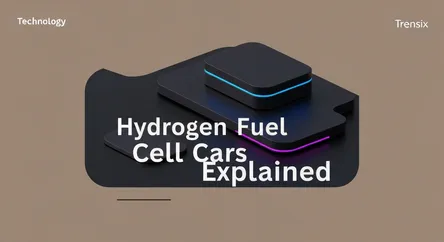Technology
Hydrogen Fuel Cell Cars Explained

Discover Hydrogen Fuel Cell Electric Vehicles (FCEVs), the zero-emission cars that create electricity from hydrogen. Learn why they're trending.
What is it?
A Hydrogen Fuel Cell Electric Vehicle (FCEV) is a type of electric car that generates its own power onboard. Instead of storing electricity in a large battery like a BEV, an FCEV has a fuel cell stack. This device combines compressed hydrogen gas from a tank with oxygen from the air in an electrochemical reaction. This process creates electricity to power the vehicle's motors, with the only byproduct being pure water vapor, making it a zero-tailpipe-emission technology.
Why is it trending?
FCEVs are gaining momentum as a key player in the future of clean transportation. Their primary advantage over battery electric vehicles is convenience; they boast longer driving ranges and can be refueled in just a few minutes, similar to a conventional gasoline car. As governments and industries worldwide push for decarbonization, and with advancements in creating 'green' hydrogen from renewable sources, FCEV technology is becoming an increasingly attractive and viable alternative for long-haul and heavy-duty transport, as well as passenger cars.
How does it affect people?
For drivers, FCEVs offer a zero-emission driving experience without the 'range anxiety' or long charging times associated with many BEVs. This technology could drastically improve urban air quality. However, the transition to hydrogen power presents challenges. The current scarcity of hydrogen refueling stations limits travel options, and the vehicles themselves remain expensive. Widespread adoption depends on significant public and private investment in building a robust hydrogen infrastructure, which will shape the future of personal mobility and energy consumption for communities globally.